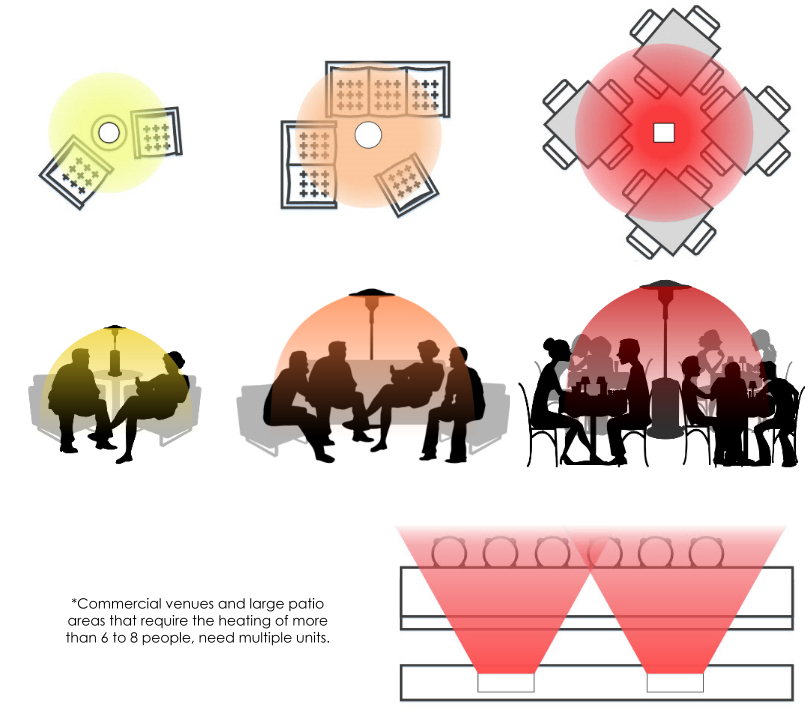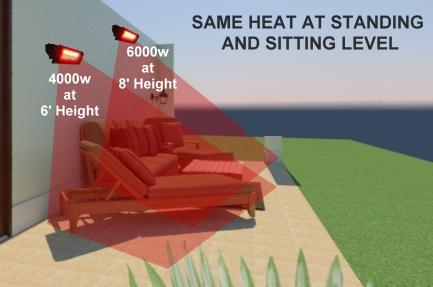.
 |
 |
 |
||
|
|
|
|
||
 |
 |
|
||
|
|
|
|
||
 |
||||
|
|
Electric, Propane, Natural Gas Patio Heaters - BEST USES
The vast majority of patio heaters operate on either Electric, Propane or Natural Gas. The correct type to choose can vary greatly according to both your resources and your needs:
ELECTRIC Patio Heaters are available in various styles such as tabletop, freestanding, hanging or ceiling/wall mounted. Electric Patio Heaters are the best option when you:
- Prefer to mount in a ceiling or on a wall;
- Prefer not to store or purchase propane;
- Do not have Natural Gas plumbing or exterior access to such;
- Do not have the required clearance around or above other patio heater types
PROPANE Patio Heaters are available in various styles such as tabletop, freestanding, hanging or ceiling/wall mounted. Propane Patio Heaters are the best option when you:
- Prefer portability;
- Do not have an electrical outlet outdoors;
- Do not have Natural Gas plumbing or exterior access to such
NATURAL GAS Heaters are available in various styles such as freestanding, in-ground or hanging. Natural Gas Heaters are the best option when you:
- Have Natural Gas plumbing available; and
- Prefer a more permanent, fixed heater;
- Prefer not to store or purchase propane;
- Do not have an electrical outlet outdoors
How Patio Heaters Work

RADIANT HEAT
Patio heaters use a type of heating technology called "radiant heating" which can be used to heat outdoor areas. While most conventional methods of heating use convection heaters, which directly heat the stagnant air, radiant heating uses heat energy from a heating element to warm people or objects, Since the air outdoors is in a constant flow, conventional heating methods are virtually ineffective as it is nearly impossible to heat air that is constantly moving. Patio Heaters, featuring radiant heat, allow people or objects, in its direct path, to be warmed.
THE MYTH ABOUT POWER: BTUs & Wattage can be misleading
When it comes to heating units, people tend to think "more power - more heat - more space." And while this seems like a sound theory, it's simply not the case. We get caught up reading BTUs and Wattage and don't consider seemingly small factors like height placement of the unit, and size of the reflector shield, that can make a huge difference.

The height of the unit in respect to the direct path to be warmed, is essential in choosing the right patio heater - especially when it comes to wall- mounted or ceiling units. For instance, a 4000 watt wall-mounted heater mounted at a 6 ft height, will feel the same heat-wise, as a 6000 watt wall-mounted heater mounted at an 8 ft height.
In respect to propane or natural gas heaters, while a 41,000 BTU unit may seem like it gives off much more radiant heat than a 35,000 BTU unit, this is not necessarily the case. The 41,000 BTU unit, gives off less than 15% more heat in the same amount of radiant space if all other specifications are the same. If the 41,000 BTU unit has a slightly larger reflector shield, the radiant space will be slightly larger but the amount of heat will be the same.
Choosing the right patio heater is essential for your comfort and safety. Let us take the heat off by contacting one of our patio heater experts at 1-800-940-6123. We're here to help!

















